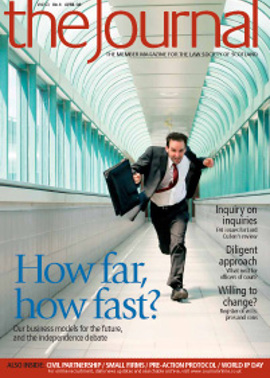Lawyer behind the camera
Before coming to the BBC, I regarded reality TV as something watched on a couch, under a blanket and through a miasma of illness. Blessed with health and employment, I rarely had any truck with anything but drama, comedy or news. A combination of sentimentality for cuddly animals, and scant interest in anything bald and whiskerless, made me an especially hard sell on the “Sadly, Sooty didn’t make it” school of veterinary journalism.
When the fur flies
These days, however, I legal Animal 24/7, and it’s been a revelation. For one thing, it would be a pity to go to your grave not knowing what happens to a swan’s neck under general anaesthetic. For another, it’s a lucky bag of media law issues. There’s contempt of court, when someone is being prosecuted – maltreating an animal, selling a dangerous breed of dog, trapping a songbird. There’s defamation, when it is suggested that someone may be guilty of such a thing. And there’s privacy, when the cameras accompany the RSPCA onto a suspect’s property. (The leading case is Clutterbuck v BBC.)
A prototypical episode might feature an owl with a broken wing, an orphaned litter of puppies and an old lady with 20 cats. Sometimes it’s less a matter of numbers than of domestic tension: three rottweilers and six guinea pigs, say, and the guinea pigs are living off their nerves; or there’s a grandchild with asthma. The crew goes in to a Feydeau-esque farce of slamming doors and flying feathers. Someone gets bitten. The RSPCA are impressively calm about this, especially if it is a journalist. They are a touchingly acceptant lot, tolerant of the cat-hoarders, apt to address fruit bats by endearment; they value all living creatures, bar fleas. They are also ideal “obs doc” (observational documentary) subjects. No camera can disturb their concentration when they’re trying to reunite a duckling with its mother.
River untamed
Of course, the RSPCA participants have a rewarding job, despite tooth, claw and human cruelty. For every dog which goes the way of all fur, they save a horse. What drives the Thames River Police, other than their engines, is more of a mystery. It would appear from River Police that they chug up and down the 35 miles of London river, pulling dead bodies out of the water and discouraging live ones from joining them.
Again, contempt and defamation issues regularly arise, but privacy considerations are important, too. In Peck v UK, the European Court of Human Rights took the view that a person caught on CCTV carrying a knife, apparently with a view to taking his own life, has a reasonable expectation of privacy even on a public street. In one episode, officers spend hours in freezing misty darkness trying to talk a would-be suicide off a bridge, only to find him at another bridge later the same week. Given the scum London water raises even after chlorination and boiling, it would be inhumane to ignore the desperation of a person contemplating meeting the Thames in its untreated state, and the temptation to give a recidivist peri-suicide a swift push in the back would be a dangerous one – it’s a fierce river. The police rehearse all the arguments again, then phlegmatically wring out their socks and go back to the station for tea and toast.
Someone whose job it is to watch the whole thing on film may be in no position to critique anyone else’s career choices, but it certainly made me glad that I had stuck in at school, and never considered a socially useful calling.
States of reality
Is this reality TV, though? Many would regard this sort of programme as a traditional fly-on-the-wall documentary. For some, “reality TV” refers to programmes which set up a situation for a group of participants and observe its evolution – Castaway, or Baby Borrowers, or the like. Typically, the focus of such programmes is anthropological interest rather than professional activity. Big Brother is the one example of reality TV on which everyone would agree, terminologically, yet on one view it is factitious – the situation observed is ersatz. Still others use “reality TV” as a dysphemism for TV which is cheap or exploitative, even if the industry would classify the product as a conventional talent show.
No doubt there’s a media studies thesis on this somewhere, but for the lawyer it barely matters. Around me, one of my colleagues is legalling I’ll Do Anything, singing snatches of the tunes whilst pondering the new rules on competitions and premium rate lines. Another is thinking hard about a contributor who is facing a criminal charge. I am wondering how to deal with two parents who have different views on their child’s participation in a programme. Point a camera at a real person for any length of time and a legal issue will develop.
Rosalind McInnes is a senior lawyer with BBC Scotland
In this issue
- Thinking ahead
- A line too often crossed
- Big leap forward
- Independence: still viable?
- FAIs: a new lease of life
- ARTL: Turquoise is in the pink
- Summary trials: deciding the facts
- Life at the sharp end
- Conscience and public service
- Wills and ways
- Achieving "senior" rates?
- CPD: the way forward
- Life on the edge
- Pre-action protocol for industrial disease claims
- Fit a doin'?
- Same difference
- Curiosity corner
- System? What system?
- Reviewing appeals
- Testing insolvency
- Scottish Solicitors' Discipline Tribunal
- Website reviews
- Book reviews
- Day of creation
- Lawyer behind the camera
- Homing in on home reports






